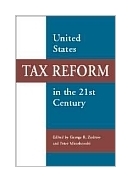|
||
• wydawnictwa polskie
• Zamów informacje o nowościach z wybranego tematu • kontakt
• Cookies na stronie |
UNITED STATES TAX REFORM IN THE 21ST CENTURY.ZODROW G., MIESZKOWSKI P.wydawnictwo: CAMBRIDGE , rok wydania 2002, wydanie Icena netto: United States Tax Reform in the 21st Century Tax reform debates in the United States have focused on the question of whether the existing corporate and individual income tax system should be replaced with some form of a national consumption tax. This book contains essays written by internationally recognized tax experts who describe the current state in economic thinking on the issue of whether fundamental tax reform is preferable to continued incremental reform of the existing income tax. The papers were originally commissioned by the James A. Baker III Institute for Public Policy at Rice University, Houston. The collection covers a range of tax policy issues related to consumption tax reforms, including their economic effects, distributional consequences, effects on administrative and compliance costs, transitional issues and the political aspects of fundamental tax reform, and international comparisons. The book will serve as a comprehensive guide to the ongoing tax reform debate to tax policy makers and the general electorate. Contributors: Charles L. Ballard, Joe Barnes, Sijbren Cnossen, William G. Gale, Malcolm Gillis, Jane G. Gravelle, Janet Holtzblatt, R. Glenn Hubbard, Dale W. Jorgenson, Peter Mieszkowski, Michael Palumbo, Peter J. Wilcoxen, George R. Zodrow.Contents1. The fundamental question in fundamental tax reform 2. Behavioral responses to a consumption tax 3. The economic impact of fundamental tax reform 4. Capital income taxation in tax reform: implications for analysis of distribution and efficiency 5. International aspects of fundamental tax reform 6. Distributive analysis of fundamental tax 7. The role of administrative issues in tax reform: simplicity, compliance, and administration 8. Evaluating NRST from a VAT perspective 9. Transitional issues in the implementation of a flat tax or a national retail sales tax 10. Historical and contemporary debate on consumption taxes 11. The politics and ideology of fundamental tax reform Bibliography 346 pages Księgarnia nie działa. Nie odpowiadamy na pytania i nie realizujemy zamówien. Do odwolania !. |


